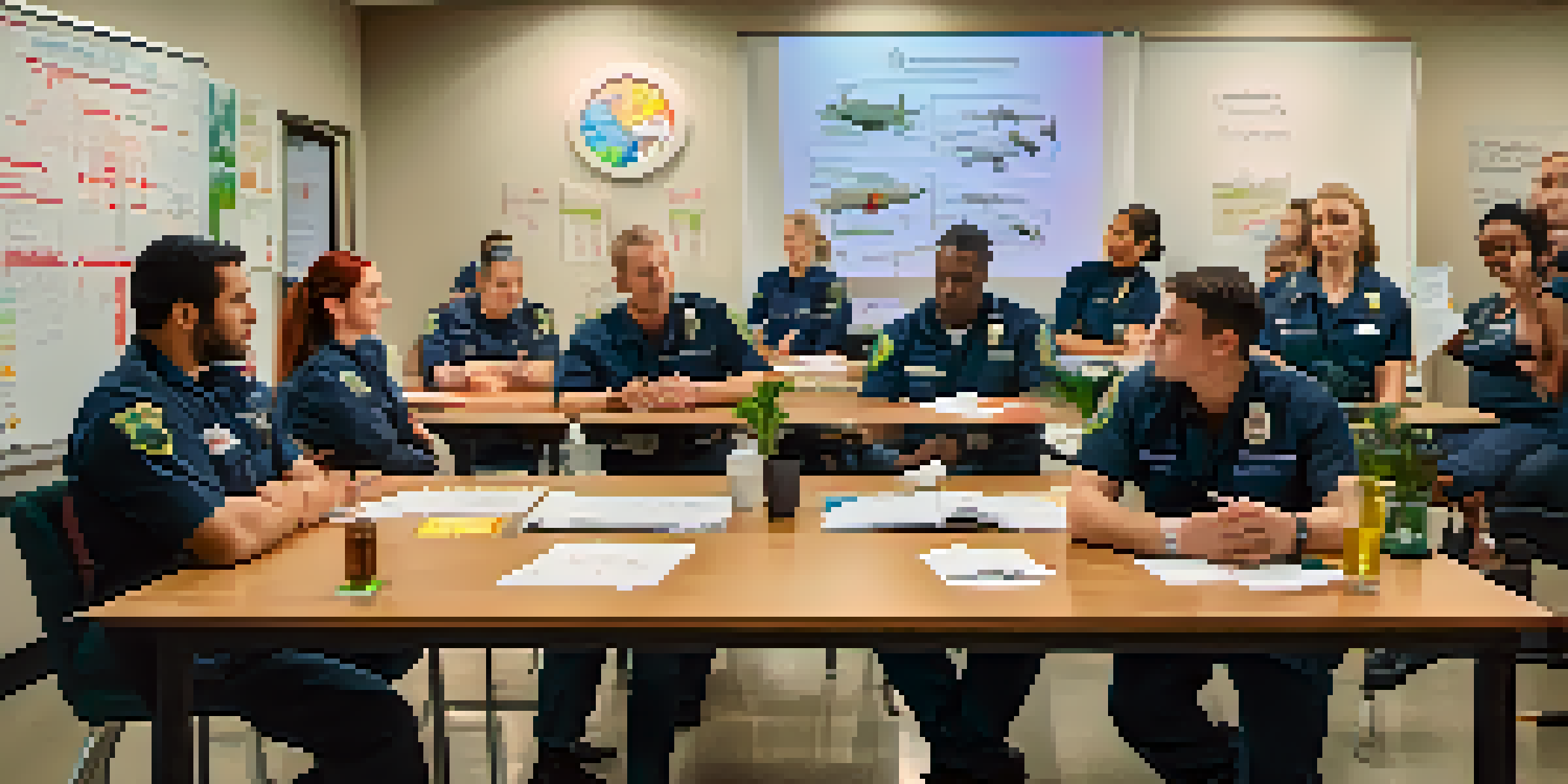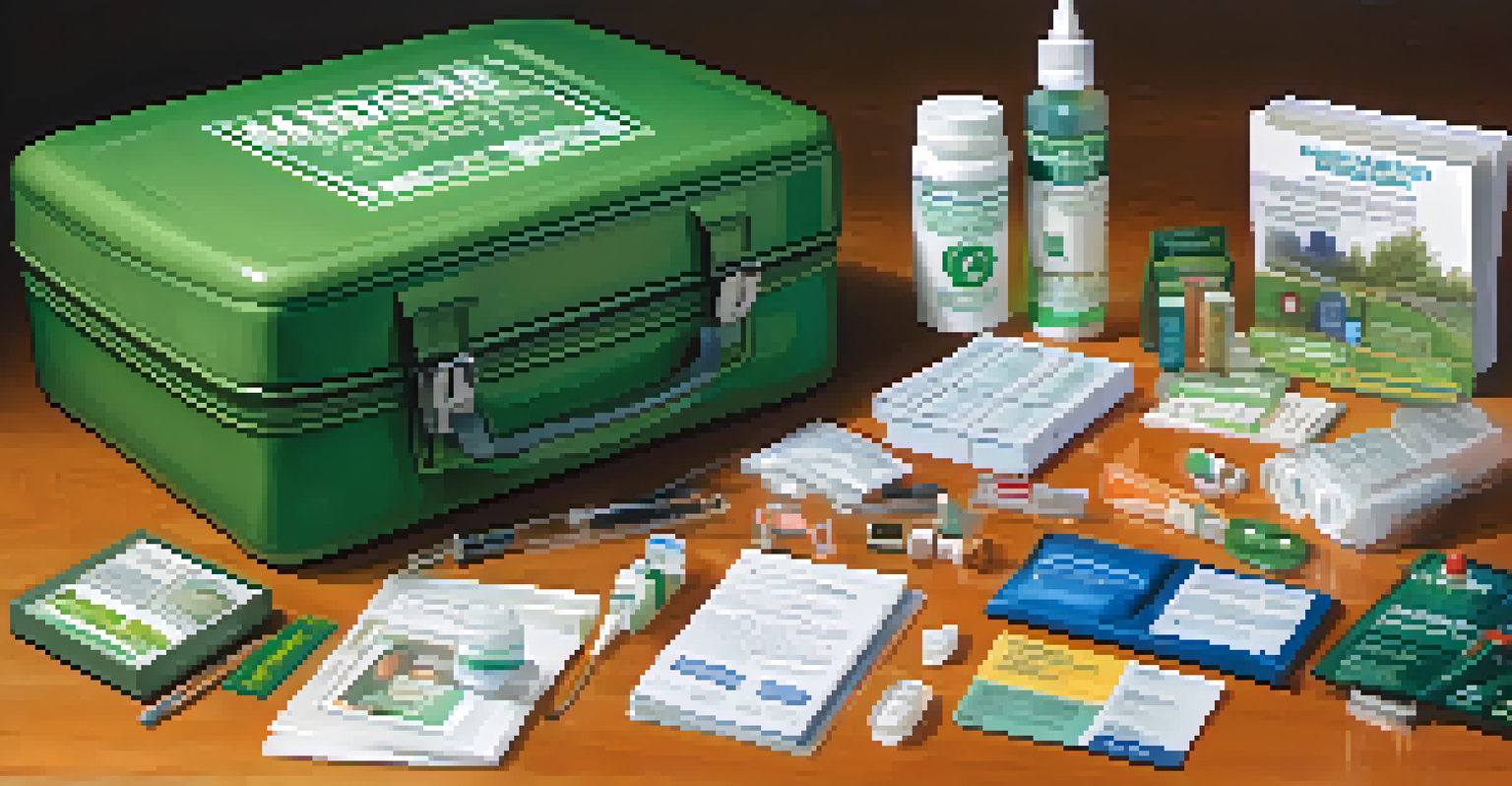The Importance of Training Emergency Responders for Marijuana

Understanding Marijuana and Its Effects on Health
Marijuana, often viewed as a recreational substance, has complex effects on the body and mind. It can alter perception, coordination, and cognitive function, which are crucial for emergency situations. Understanding these effects helps responders assess a patient's condition accurately.
Marijuana may have therapeutic benefits, but it can also impair judgment and coordination, affecting emergency response.
For instance, a person under the influence may exhibit behaviors that mimic other medical conditions, leading to misdiagnosis. This is why it's vital for emergency responders to be trained to recognize the signs of marijuana impairment. By doing so, they can provide appropriate care and avoid unnecessary complications.
Furthermore, with the increasing legalization of marijuana across various states, the likelihood of encountering impaired individuals during emergencies is growing. Enhanced training ensures that responders can differentiate between typical medical emergencies and those influenced by marijuana.
The Legal Landscape Surrounding Marijuana Use
As laws regarding marijuana use continue to evolve, emergency responders must stay informed. Different jurisdictions have varying regulations, which can impact how responders approach situations involving marijuana. This legal complexity necessitates comprehensive training to ensure compliance and proper handling of cases.

For example, in some states, possessing small amounts of marijuana is legal, while others impose strict penalties. An informed responder can navigate these laws confidently, making decisions that uphold legal standards while ensuring patient safety. This knowledge aids in establishing trust with the community they serve.
Training Enhances Impairment Recognition
Emergency responders need training to accurately identify marijuana impairment and provide appropriate care.
Moreover, understanding the legal implications can help responders avoid potential liability issues. By being educated on the laws, they can act decisively and prudently, ultimately enhancing their efficacy in emergency scenarios.
Training for Recognizing Marijuana Impairment
Recognizing marijuana impairment is essential for emergency responders to make informed decisions. Training programs should focus on identifying the signs, which can include altered speech, red eyes, and impaired motor skills. This knowledge enables responders to assess the situation accurately and provide appropriate care.
Education is the most powerful weapon which you can use to change the world.
For instance, a person involved in a car accident may appear disoriented, but it’s crucial to determine whether this is due to marijuana use or another medical issue. By honing their observational skills, responders can differentiate between various conditions, leading to better outcomes for patients.
Additionally, proper training fosters confidence among responders. When they are well-versed in identifying marijuana impairment, they can act swiftly and effectively, ensuring that patients receive timely and appropriate medical attention.
Importance of Collaboration with Healthcare Providers
Emergency responders often work closely with healthcare providers, making collaboration essential in cases involving marijuana. By sharing knowledge and experiences, both parties can enhance their understanding of marijuana's impact on health. This synergy leads to a more effective response to emergencies.
For example, when responders arrive at a scene, they can relay crucial information about a patient’s condition to the medical team. If they recognize marijuana impairment, they can ensure that healthcare providers are aware, allowing for tailored treatment plans. This collaboration ultimately improves patient care and outcomes.
Legal Knowledge Ensures Compliance
Understanding varying marijuana laws helps responders navigate legal complexities and maintain patient safety.
Moreover, ongoing communication between responders and healthcare professionals can lead to better training programs. By discussing case studies and sharing insights, both groups can refine their approaches to handling marijuana-related emergencies.
Addressing Stigma Around Marijuana Use
Training emergency responders on marijuana also helps address the stigma surrounding its use. Many individuals may fear judgment when seeking help, especially if they believe responders have preconceived notions about marijuana users. By fostering an understanding and empathetic approach, responders can create a safe environment for all patients.
For instance, when responders are educated on the medicinal benefits of marijuana, they can better appreciate its role in a patient's life. This knowledge helps them treat patients with respect and understanding, regardless of their marijuana use. Such an attitude can significantly impact the quality of care provided.
Additionally, reducing stigma can encourage individuals to seek help without fear of repercussions. When responders approach situations with an open mind, they contribute to a more compassionate healthcare system, ultimately benefiting both patients and responders.
Enhancing Community Trust Through Education
When emergency responders are trained on marijuana, it enhances community trust. Residents are more likely to feel safe and supported by responders who are knowledgeable and understanding about various substances. This trust can lead to better cooperation during emergencies, ultimately improving public safety.
For example, communities with well-informed responders are likely to foster open dialogues about drug use and safety. This transparency encourages individuals to seek help when needed, knowing that they will be treated with respect. Education, therefore, becomes a tool for building stronger community ties.
Collaboration Improves Patient Outcomes
Working closely with healthcare providers allows emergency responders to deliver tailored treatment for marijuana-related cases.
Furthermore, as responders engage with the community, they can share information about safe marijuana use and its effects. By educating the public, they empower individuals to make informed decisions, contributing to overall community well-being.
Continuous Training and Adaptation in a Changing Landscape
As marijuana legislation and societal perceptions evolve, continuous training for emergency responders is crucial. Regular updates on new research and changing laws ensure that responders remain equipped to handle marijuana-related emergencies effectively. This adaptability is key to providing high-quality care in a dynamic environment.
For instance, keeping abreast of new strains of marijuana and their varying effects can significantly enhance a responder's ability to assess situations. Additionally, understanding trends in marijuana use within the community can inform their approach to education and outreach.

Ultimately, ongoing training fosters a culture of learning and adaptation among responders. As they embrace new information and techniques, they can enhance their skills, ensuring they are prepared for the challenges posed by marijuana use in emergency situations.